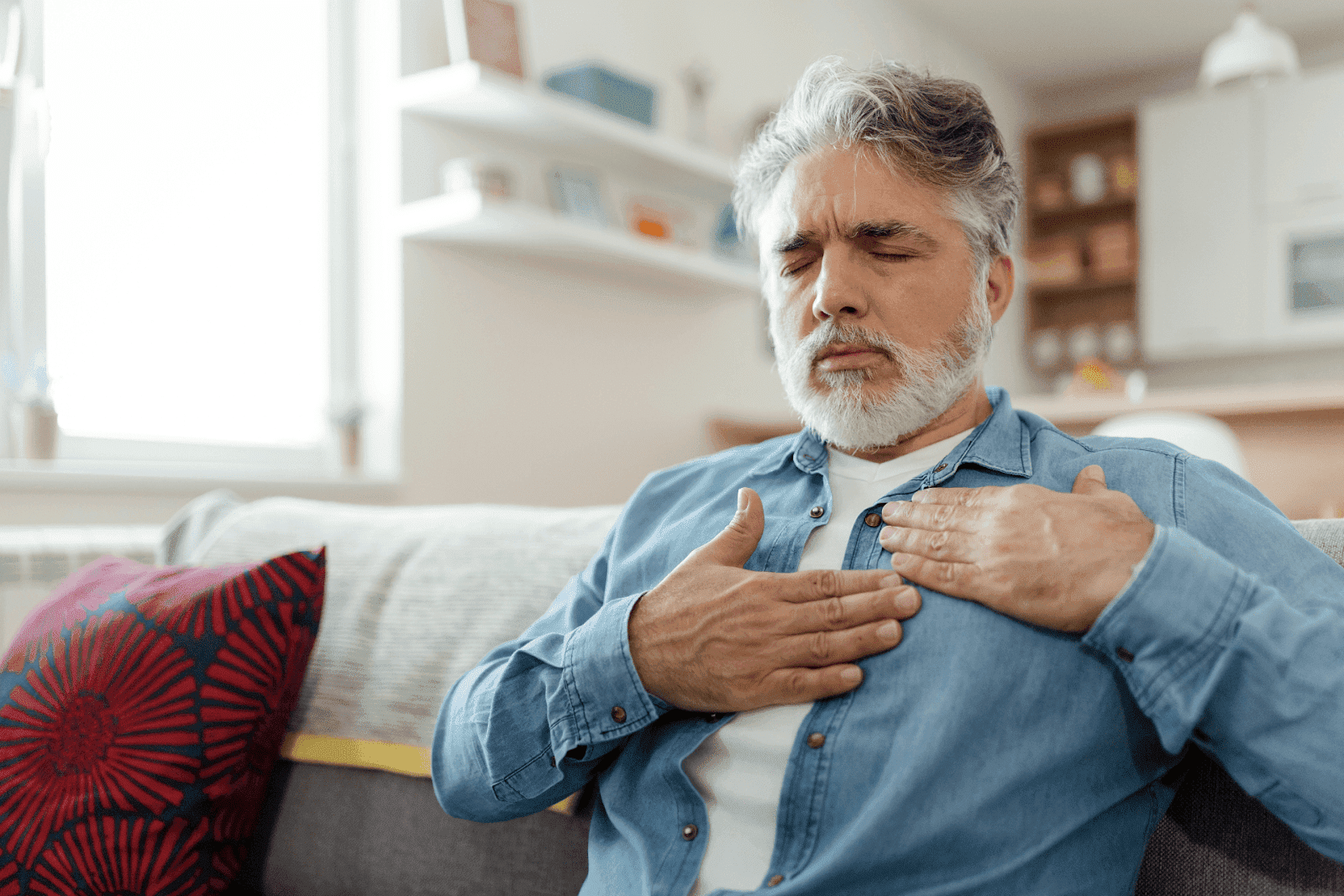Gas or Heart Attack? How to Tell the Difference
Chest pain can be alarming, especially when you’re unsure if it’s something as simple as gas or something as serious as a heart attack. Understanding the differences between [...]
Read More
Medically reviewed by Alan Lucks | MD, Alan Lucks MDPC Private Practice - New York on October 12th, 2025.
True cardiac pain typically presents as crushing pressure lasting 15+ minutes that doesn't improve with position changes, while gas pain is sharp and stabbing, often relieving within minutes when you burp or change positions.
Heart attack symptoms frequently include sweating, nausea, shortness of breath, and pain radiating down the left arm or up to the jaw—gas pain rarely causes these systemic symptoms.
Gas-related discomfort worsens after eating gas-producing foods (beans, carbonated drinks, high-fiber foods) and improves with walking or anti-gas medications like simethicone.
Coronary events become more likely after age 45 in men and 55 in women, especially with risk factors like diabetes, smoking, or family history—gas pain has no age or gender patterns.
Call 911 immediately if chest discomfort lasts over 15 minutes, comes with sweating or arm pain, or feels like "an elephant sitting on your chest"—these descriptions rarely apply to digestive issues.
Chest pain can be alarming, especially when you’re unsure if it’s something as simple as gas or something as serious as a heart attack. Understanding the differences between these two conditions is crucial because while gas is usually harmless and temporary, a heart attack requires immediate medical attention. This article will guide you through the symptoms, causes, and when to seek help, helping you make informed decisions about your health. When in doubt, a medical evaluation is critical.
Chest discomfort is one of the most common reasons people seek medical care. However, not all chest pain is cardiac-related. Gas, indigestion, or acid reflux can cause chest pain that mimics heart attack symptoms. Misinterpreting these signs can lead to unnecessary panic or, conversely, dangerous delays in treatment.
Heart disease remains a leading cause of death worldwide, so recognizing the warning signs of a heart attack can save lives. On the other hand, gas-related pain is generally manageable and less urgent. Knowing the difference helps prevent unnecessary emergency room visits while ensuring timely care when it’s truly needed.
Understanding the physiological differences between gas pain and heart attack symptoms is crucial. Gas pain often presents as a sharp or cramping sensation, typically localized in the abdomen or radiating to the back, and may be accompanied by bloating or belching. In contrast, heart attack symptoms can include a feeling of pressure or tightness in the chest, often described as a heavy weight, and may radiate to the arms, neck, or jaw. These distinctions can be pivotal in determining whether one should seek immediate medical attention or manage discomfort with over-the-counter remedies.
Moreover, lifestyle factors play a significant role in the prevalence of gas-related discomfort. Diets high in fatty foods, carbonated beverages, and certain carbohydrates can exacerbate gas production, leading to discomfort that may be mistaken for more serious conditions. Conversely, understanding risk factors for heart disease, such as high cholesterol, smoking, and sedentary behavior, can empower individuals to make healthier choices. By fostering awareness of these factors and symptoms, individuals can better navigate their health and respond appropriately to their body's signals.
 Common Causes of Chest Pain: Gas vs. Heart Attack
Common Causes of Chest Pain: Gas vs. Heart AttackGas builds up in the digestive tract when swallowed air or the breakdown of certain foods produces excess gas. This can cause bloating, sharp pains, or a feeling of pressure in the chest or upper abdomen. Common triggers include eating too quickly, consuming carbonated beverages, or eating gas-producing foods like beans and broccoli.
Gas pain often comes with other digestive symptoms such as burping, flatulence, or abdominal discomfort. It tends to improve with passing gas or bowel movements and usually does not worsen with physical activity. Additionally, individuals who experience chronic gas pain may find that certain dietary adjustments can significantly alleviate their symptoms. For instance, incorporating probiotics or digestive enzymes into their diet may help balance gut bacteria and improve digestion, thereby reducing gas production. Keeping a food diary can also be beneficial in identifying specific foods that trigger gas, allowing for more informed dietary choices.
A heart attack occurs when blood flow to part of the heart muscle is blocked, often due to a clot in the coronary arteries. This blockage deprives the heart of oxygen, causing tissue damage. Common risk factors include high blood pressure, smoking, diabetes, obesity, and a family history of heart disease.
Heart attack pain is caused by the heart muscle struggling due to reduced oxygen. It can present as pressure, tightness, or squeezing in the chest and may radiate to the arms, neck, jaw, or back. Unlike gas pain, it usually does not improve with digestive remedies and may worsen with exertion. Recognizing the early signs of a heart attack is crucial, as prompt medical intervention can be life-saving. Symptoms can vary widely between individuals; for example, women may experience more subtle signs such as fatigue, shortness of breath, or nausea, which can lead to delays in seeking help. Understanding these differences can empower individuals to act quickly in the face of potential cardiac events, emphasizing the importance of awareness and education regarding heart health.
Gas pain is often described as sharp, stabbing, or cramp-like and is usually localized to the upper abdomen or lower chest. It may come and go and is often relieved by burping or passing gas. Other digestive symptoms like nausea, bloating, or a feeling of fullness frequently accompany it.
Importantly, gas pain does not typically cause sweating, shortness of breath, or dizziness. It also tends to be less severe and doesn’t worsen with physical activity.
Heart attack symptoms can vary but commonly include:
Chest pain or discomfort described as pressure, squeezing, fullness, or pain lasting more than a few minutes or recurring
Pain radiating to the arms, neck, jaw, back, or stomach
Shortness of breath
Cold sweat, nausea, or lightheadedness
Unexplained fatigue or weakness, especially in women
If you experience any of these symptoms, especially in combination, it’s critical to seek emergency medical care immediately.
Chest pain should never be ignored. If you’re unsure whether your symptoms are due to gas or a heart attack, it’s always safer to err on the side of caution. Call emergency services if you experience:
Severe or persistent chest pain
Chest pain accompanied by shortness of breath, sweating, nausea, or dizziness
Chest pain radiating to other parts of the body
Sudden weakness or loss of consciousness
For less severe symptoms or questions about your health, telehealth services can provide quick access to medical advice. Doctronic.ai offers free AI doctor visits that can help you understand your symptoms and decide if you need urgent care. Their AI doctor synthesizes the latest medical research to provide personalized, reliable answers in seconds.
In situations where chest pain is mild or you’re uncertain about your symptoms, consulting a healthcare professional quickly is vital. Telehealth platforms like Doctronic.ai provide convenient, affordable access to medical expertise without leaving your home.
Doctronic’s AI doctor offers 24/7 availability and can remember your medical history to provide a more personalized assessment. With over 10 million users, it’s a trusted resource for primary care powered by the most current medical knowledge. If the AI doctor identifies symptoms that need urgent attention, it will guide you to seek emergency care promptly.
Managing your diet and habits can help reduce gas-related chest pain. Consider these tips:
Eat slowly and chew food thoroughly
Avoid carbonated drinks and chewing gum
Limit intake of gas-producing foods like beans, onions, and cruciferous vegetables
Stay active to promote digestion
Manage stress, which can affect digestion
Heart disease prevention is essential for long-term health. Key strategies include:
Eating a balanced diet rich in fruits, vegetables, whole grains, and lean proteins
Regular physical activity
Maintaining a healthy weight
Not smoking and limiting alcohol consumption
Controlling blood pressure, cholesterol, and diabetes
Regular check-ups with your healthcare provider can help monitor your heart health and catch potential issues early.
 Trust Your Instincts and Use Available Resources
Trust Your Instincts and Use Available ResourcesDistinguishing between gas and a heart attack can be challenging, but understanding the symptoms and risk factors can guide you to the right action. Remember, chest pain accompanied by other warning signs should be treated as a medical emergency.
For non-emergency concerns or questions, platforms like Doctronic.ai offer a fast, reliable way to get expert advice. With AI-powered care that draws on the latest medical research and remembers your history, Doctronic is revolutionizing how people access primary care.
When in doubt, don’t hesitate to seek help. Your health and peace of mind are worth it.
When it comes to your health, every second counts. Whether you're facing the uncertainty of chest pain or have other health concerns, Doctronic is here to provide immediate, personalized medical advice. Our AI doctor is revolutionizing the way you receive care, offering free AI doctor visits that are not only fast but tailored to your unique medical history. With over 10 million satisfied users and the ability to connect with our doctors via telehealth video visits, we ensure you receive the most modern, peer-reviewed medical expertise available. Don't wait in line or worry in silence. Talk to an AI Doctor Now, for free, and experience the smarter, more personal healthcare you deserve.
The critical distinction is sustained crushing pressure with systemic symptoms (heart) versus sharp, localized pain that improves with gas relief (digestive). When in doubt, seek immediate medical attention since heart attacks require treatment within hours to prevent permanent damage. If you're experiencing chest discomfort and need guidance on your symptoms, Doctronic can help assess your situation.
Chest pain can be alarming, especially when you’re unsure if it’s something as simple as gas or something as serious as a heart attack. Understanding the differences between [...]
Read More